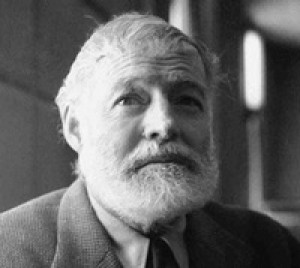Ernest Hemingway ranks as the most famous of twentieth-century American writers; like Mark Twain, Hemingway is one of those rare authors most people know about, whether they have read him or not. The difference is that Twain, with his white suit, ubiquitous cigar, and easy wit, survives in the...
show more
Ernest Hemingway ranks as the most famous of twentieth-century American writers; like Mark Twain, Hemingway is one of those rare authors most people know about, whether they have read him or not. The difference is that Twain, with his white suit, ubiquitous cigar, and easy wit, survives in the public imagination as a basically, lovable figure, while the deeply imprinted image of Hemingway as rugged and macho has been much less universally admired, for all his fame. Hemingway has been regarded less as a writer dedicated to his craft than as a man of action who happened to be afflicted with genius. When he won the Nobel Prize in 1954, Time magazine reported the news under Heroes rather than Books and went on to describe the author as "a globe-trotting expert on bullfights, booze, women, wars, big game hunting, deep sea fishing, and courage." Hemingway did in fact address all those subjects in his books, and he acquired his expertise through well-reported acts of participation as well as of observation; by going to all the wars of his time, hunting and fishing for great beasts, marrying four times, occasionally getting into fistfights, drinking too much, and becoming, in the end, a worldwide celebrity recognizable for his signature beard and challenging physical pursuits.
show less

